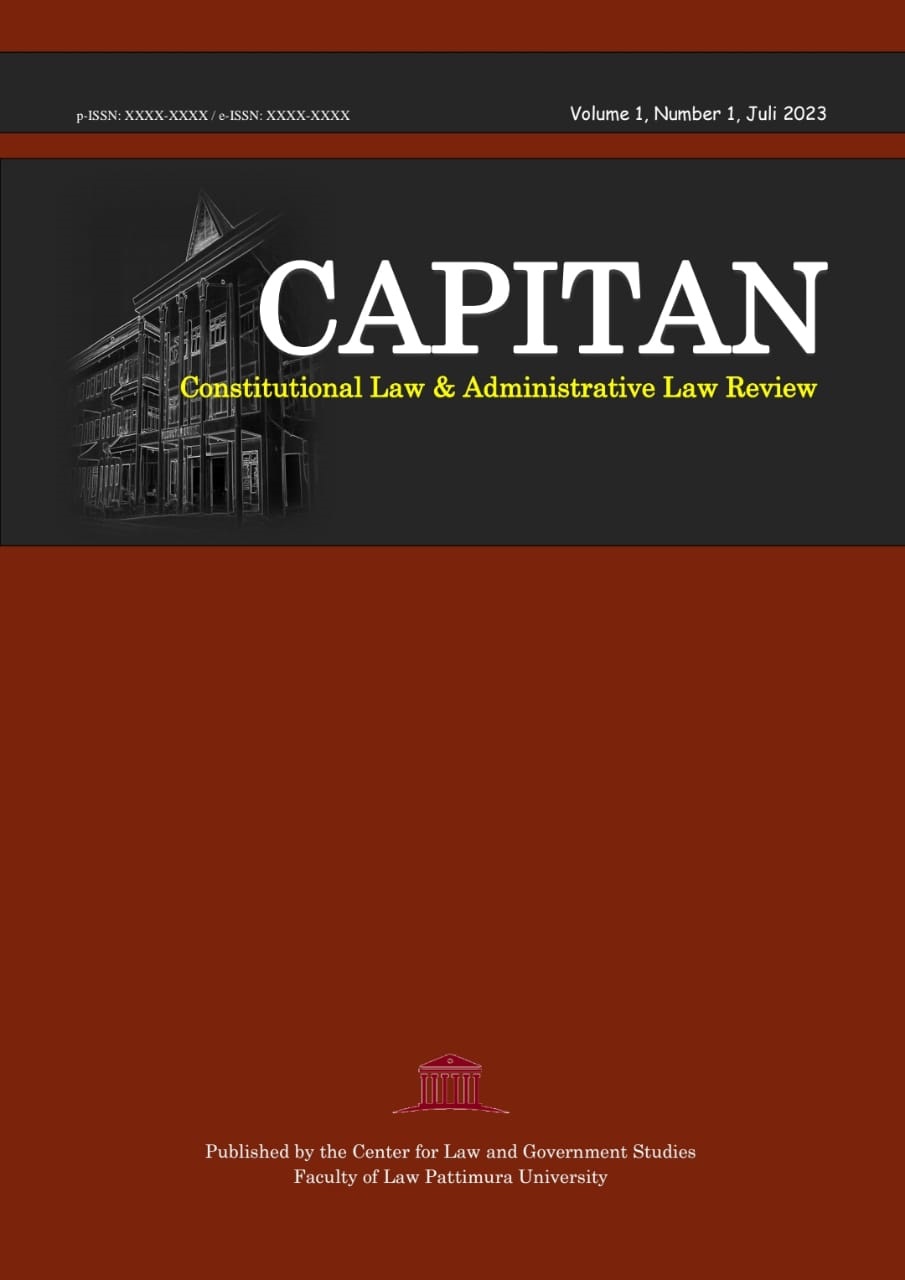Kewenangan Majelis Permusyawaratan Rakyat Melantik Presiden Dan Wakil Presiden
Abstract
The authority of the MPR in inaugurating the President and Vice President is the only thing that is routinely done every 5 years since the amendment of the 1945 Constitution, which in its implementation tends to be merely ceremonial. Some of the MPR's constitutional powers do not yet have legal regulations, one of which is the authority to appoint the President and Vice President. So far, the appointment of the President and Vice President has only been carried out by reading the Decision from the KPU by the MPR RI leadership, leading many parties to question the legality of the MPR in appointing the President and Vice President. This research aims to analyze the plenary session process of the inauguration of the President and Vice President, regarding the authority of the MPR in inaugurating the President and Vice President as regulated in Article 3 Paragraph (2) of the 1945 Constitution of the Republic of Indonesia. Then, this research aims to analyze the legal strength of the inauguration minutes of the President and Vice President as the legal basis for their appointment. The normative legal research method involves primary and secondary legal sources and a legislative approach that focuses on the analysis and examination of legal regulations. The researcher uses primary and secondary data collection techniques in the form of laws and legal books, expert opinions, and legal journals. This research provides input to the MPR to issue a decree in the form of a decision (beschikking) regarding the determination of the winning pairs of presidential and vice-presidential candidates in the election as the President and Vice President of the Republic of Indonesia for the next five-year term, so that the President and Vice President have a stronger legal basis in the form of an MPR decree.
Downloads
References
Affandi, Hernadi, “Pelantikan Presiden dan Wakil Presiden dan Pelaksanaan sidang Tahunan: Paradoks Kewenagan Eksklusif Majelis Permusyawaratan Rakyat“, Jurnal Majelis, Edisi 6 (2020).
Fauzia, N., Laturette, A. I., & Radjawane, P, “Kekuatan Hukum Berita Acara Penyelesaian Sengketa Tanah Oleh Kelurahan Watolo Sebagai Alas Hak Atas Tanah”, TATOHI: Jurnal Ilmu Hukum, Vol. 3, No. 3, (2023).
https://www.kompasiana.com. mengenal-perbedaan-pelantikan-dengan-pengukuhan-serta-contoh-naskahnya.
M. Wildan Humaidi, “Kontestasi Politik Kewargaan Indonesia,” Jurnal Al-Daulah, Vol. 9, No. 1, (2020).
Ni'Matul Huda, Hukum Tata Negara Indonesia, Jakarta: Rajawali Pers, 2011.
Peter Mahfud Marzuki, Penelitian Hukum, Jakarta: Kencana, 2007.
Putu Ayu Anastasia Wierdarini, “Tinjauan Yuridis Terhadap Pengembalian Kewenangan Istimewa Majelis Permusyawaratan Rakyat Melalui Perubahan Undang-Undang Dasar Negara Republik Indonesia Tahun 1945”, Jurnal Yuridis, Vol. 5 No. 1, Juni (2018).
Rifqi, M. Studi Komparatif Kedudukan Majelis Permusyawaratan Rakyat Republik Indonesia (MPR-RI) Sebelum Dan Pasca Amandemen Undang-Undang Dasar Negara Republik Indonesia Tahun 1945, Jakarta: Diss. Hukum Tata Negara, 2021.
Undang-Undang Dasar Negara Republik Indonesia Tahun 1945, Jakarta: Sekretariat Jenderal MPR RI, 2018.
Winda Sari, “Pertanggungjawaban Presiden Indonesia Dalam Prosedur dan Materi Sumpah Jabatan”, Daulah Jurnal Hukum Pidana dan Ketatanegaraan, Vol. 12, No.2, (2023).
Wulandari, Ines. ANALISIS PEMILIHAN PRESIDEN DAN WAKIL PRESIDEN DI INDONESIA DALAM PERSPEKTIF HUKUM ISLAM (Studi terdahap Undang-Undang No 42 Tahun 2008 tentang Pemilihan Umum Presiden dan Wakil Presiden). Lampung: Diss. UIN Raden Intan, 2018.
Copyright (c) 2025 Petra Talakua, Reny Heronia Nendissa, Muhammad Irham (Author)

This work is licensed under a Creative Commons Attribution-NonCommercial 4.0 International License.
Authors who publish their manuscripts in this Journal agree to the following conditions:
- The copyright in each article belongs to the author, as well as the right to patent.
- Authors are able to enter into separate, additional contractual arrangements for the non-exclusive distribution of the journal's published version of the work (e.g., post it to an institutional repository or publish it in a book), with an acknowledgment of its initial publication in this journal.
- Authors are permitted and encouraged to post their work online (e.g., in institutional repositories or on their website) prior to and during the submission process, as it can lead to productive exchanges, as well as earlier and greater citation of published work.
- Authors have the right to self-archiving of the article (Author Self-Archiving Policy)













